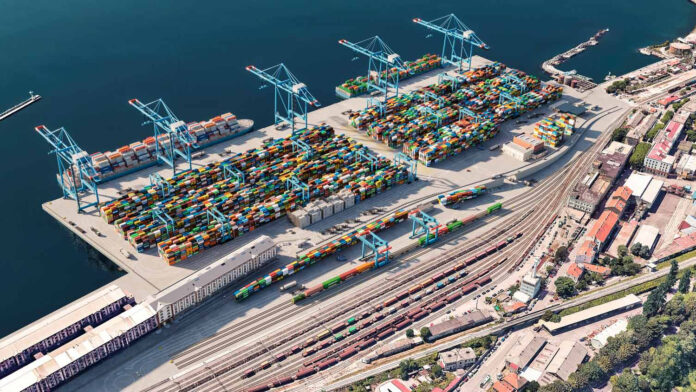Port operators APM Terminals and ENNA Group have tapped Deutsche Telekom subsidiary Hrvatski Telekom for a ‘private’ slice of its public 5G network at their joint-venture development at the new Port of Rijeka, set to be the largest shipping port in Croatia when it opens in 2025. It is understood Hrvatski Telekom will deploy new radio (RAN) infrastructure at the shipping terminal, but that the service will be managed on a ‘slice’ via its public core 5G network.
The identity of the network equipment vendor in the project is unclear, but Hrvatski Telekom works with Ericsson on its public network. Standalone 5G (SA) is being deployed as part of the project, in what sounds like a first for Hrvatski Telekom. Rijeka Gateway said its motivation to deploy a private/sli 5G network is to do with “environmental responsibility and technological advancement”.
APM Terminals and ENNA Group signed a 51/49 joint venture deal in late 2021 to construct and operate a high-tech container terminal on Croatia’s Adriatic coast. The project, called Rijeka Gateway, and managed by the pair under the same brand, will be developed in two phases. Phase one is due for completion in the second quarter of 2025. Total investments, including from Danish shipping giant Maersk, parent of APM Terminals, will top €480 million by 2026.
Once completed, the terminal will have a 680 metre long berth, and an throughput of over a million (“1,055,000”) twenty-foot containers (equivalent units; TEUs) per annum. The shipping port will be entirely operated with remote-controlled electrical container handling equipment, in line with APM Terminals’ own decarbonisation and automation strategy – which goes under the banner, ‘Terminal of the Future’.
As a ground-up development, with no legacy private LTE network, the site will go straight to 5G SA technology in a private network setup, according to the port operating group. It will be Hrvatski Telekom’s “first installation to use SA architecture”, said a statement. APM Terminal has numerous private 4G/5G (mostly 4G) deployments across its port-portfolio, including in Aarhus in Denmark, Valencia in Spain, Aqaba in Jordan, Lagos in Nigeria, and the Yucatán peninsula in Mexico.
APM Terminals oversees wireless connectivity in more than 70 ports worldwide. Hrvatski Telekom said it will provide a “comprehensive managed service… on a turnkey basis”. Both parties refer to the network as a ‘private’ one. But a statement from Rijeka Gateway also said of the setup: “Rijeka Gateway… will use the public mobile network for its predominantly-remotely operated electric container handling equipment.”
A statement from Hrvatski Telekom said: “APM Terminals will… migrate from 5G NSA to the 5G SA [and] thus becoming the first user of a dedicated network slice for industrial applications.” The pair talked about the need for 5G, whether actually private or sliced, to support “standardisation of terminal operating systems, GPS detection systems, remote equipment operation, optical character recognition, and thousands of IoT sensors on equipment”.
They said: “Wi-Fi networks, with potential instability, are reaching their limit for reliably handling the increased data volumes demanded by APM Terminals’ digital transformation.” Rijeka Gateway is intended to be the main entry point for container traffic to the hinterland countries and markets of Europe, and to play a crucial role in the development of the local economy. It is billed as “one of the most comprehensive infrastructure projects” since the founding of the Republic of Croatia.
Peter Corfitsen, chief executive at Rijeka Gateway, said: “We are developing one of the most technologically advanced terminals. From the beginning… the goal [was to minimise] the impact on the environment and the local community. [It] will be the only terminal in this part of Europe with remotely operated cranes; almost all equipment will be electric, and we are installing very advanced energy optimization and overall terminal management systems.”
He added: “Quality and reliable communication infrastructure is a prerequisite for such operations.” Marijana Bačić, chief operating officer for business customers at Hrvatski Telekom, said: “This project demonstrates Rijeka Gateway’s confidence in our ability to provide a high availability service for flawless 24/7 port operations. It confirms our strategy in providing business-critical communication through our public mobile network.”

